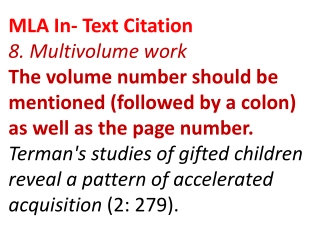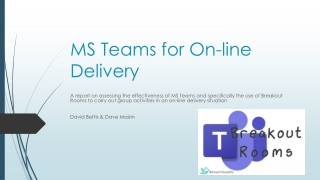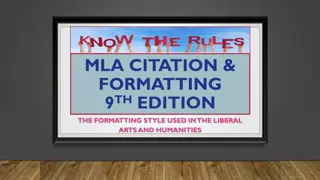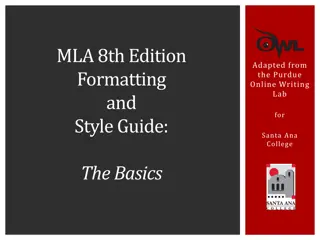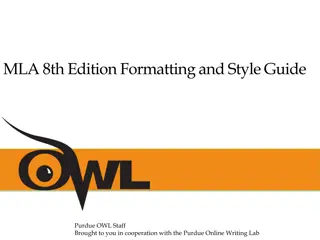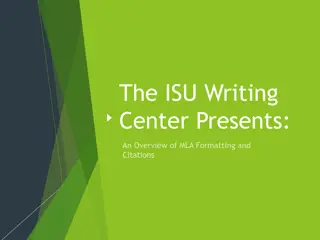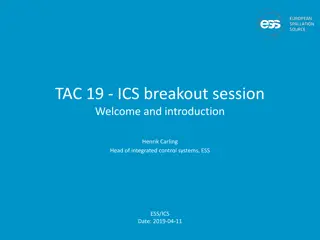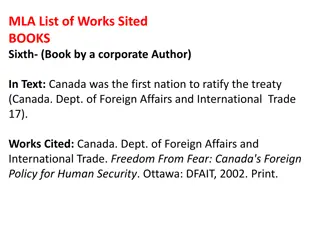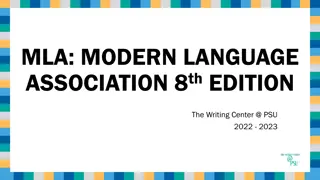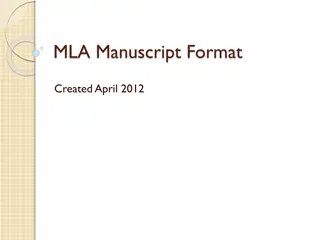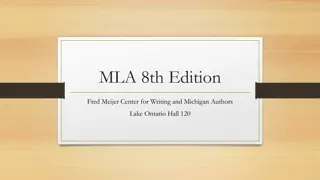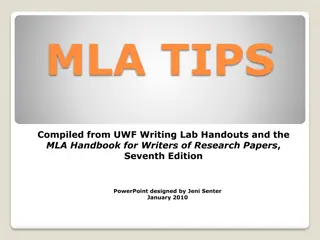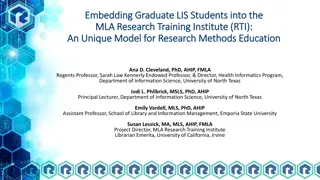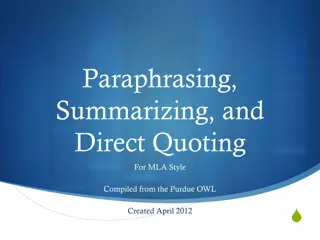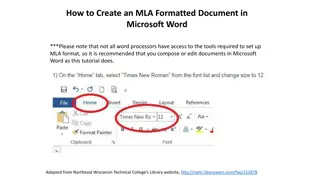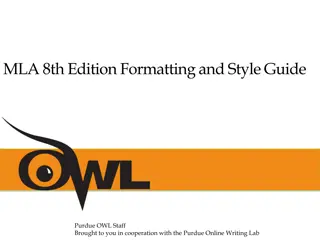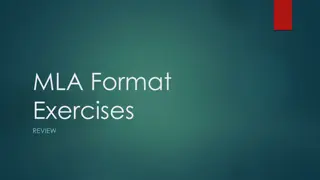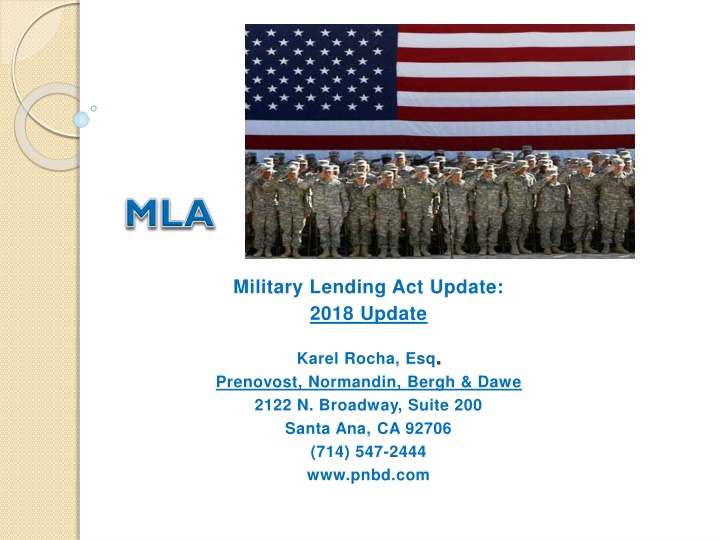
Military Lending Act Updates 2018: Credit Card Rules, Exempt Loans, and Disclosure Format
Stay informed about the latest updates to the Military Lending Act in 2018, covering important topics such as credit card rules, exempt loans/credit transactions, and disclosure format requirements. Learn how credit card issuers are impacted, which transactions are exempt, and the specifics of disclosure formats.
Download Presentation

Please find below an Image/Link to download the presentation.
The content on the website is provided AS IS for your information and personal use only. It may not be sold, licensed, or shared on other websites without obtaining consent from the author. If you encounter any issues during the download, it is possible that the publisher has removed the file from their server.
You are allowed to download the files provided on this website for personal or commercial use, subject to the condition that they are used lawfully. All files are the property of their respective owners.
The content on the website is provided AS IS for your information and personal use only. It may not be sold, licensed, or shared on other websites without obtaining consent from the author.
E N D
Presentation Transcript
Military Lending Act Update: 2018 Update Karel Rocha, Esq. Prenovost, Normandin, Bergh & Dawe 2122 N. Broadway, Suite 200 Santa Ana, CA 92706 (714) 547-2444 www.pnbd.com
Credit Card Rules Credit Card issuers may no longer rely on the member s representations as to covered status
Exempt Loans/Credit Any credit transaction that is an exempt transaction for purposes of Regulation Z (other than a transaction exempt under 12 CFR 1026.29, which addresses State- specific exemptions) or otherwise is not subject to disclosure requirements under Regulation Z; and Any transaction in which the borrower is not a covered borrower.
Disclosure Format Disclosures must be made orally and in writing; Oral disclosure can be done in person or via toll-free telephone number; Toll free number must be in the credit application or on the written disclosures.
Identifying Covered Borrowers Credit union can use safe harbor MLA search by either (a) using the DMDC MLA webpage; or (b) using a nationwide consumer reporting agency report.
MLA search requires you to provide the borrower s name, date of birth and social security number
Search must be performed BEFORE account is opened or transaction occurs.
MLA Search Safe Harbor Search Can Be Done at: https://mla.dmdc.osd.mil/ Recommend That You Always Print Out or Save Electronic Copy of Results and Keep For the Duration of the Loan/Note
Other Restrictions No roll-over loans. A creditor cannot roll- over or refinance the same loan, unless the new loan results in more favorable terms for the member. No mandatory waivers of consumer protection laws. Creditors cannot require members to waive any state or federal law, including any provisions of the Servicemembers Civil Relief Act ( SCRA ), which generally protects servicemembers from being sued while on active duty.
No mandatory arbitration.Creditors cannot require members to submit to mandatory arbitration. No mandatory allotments. A creditor cannot require members to create a voluntary allotment in order to get the loan. An allotment is an automatic amount of money taken from member s paycheck to pay back the loan. No prepayment penalty.A creditor cannot charge a penalty when member pays back part or all of a loan early.
Cross-Collateral Restrictions MLA prohibits taking a security interest in funds a member has on deposit with credit union UNLESS the funds were deposited with the credit union AFTER the extension of credit in an account established in connection with the specific credit transaction. Blanket cross-collateral provisions will be considered an MLA violation.
MLA Violations Knowing violations are a misdemeanor; Person who violates MLA shall be liable for actual damages not less than $500 per violation; Punitive Damages; Equitable and Declaratory Relief; Reasonable Attorneys Fees and Costs.
MLA Violations Any credit agreement, promissory note, or other covered contract is VOID FROM INCEPTION if it fails to comply with any provision of the DOD s MLA Final Rule; Covered Borrower must bring a civil action within 2 years of discovery it the violation but not later than 5 years after it allegedly occurred.
Lawsuit Defenses Violation was not intentional; and Violation resulted from a bona fide error notwithstanding the credit union having procedures reasonably adapted to prevent such errors.
SCRA Servicemembers Civil Relief Act Originally enacted as the Soldiers & Sailors Civil Relief Act in 1940 Amended 12 times since then including the name change in 2003
SCRA applies to debtors when: Debtor is in military service, and On ACTIVE DUTY, and Debtor is materially affected or disadvantaged as a result of ACTIVE DUTY status.
Protected Members Members on Active Duty in the Army, Navy, Air Force, Marines or Coast Guard on full time active military duty Includes reporting for basic training; and Full time training (boot camp, etc)
National Guard included so long as member is under call to service for a period of more than 30 consecutive days for purpose of national emergency response.
Protected Period The protection begins on the date of entering active duty and generally terminates within 30 to 90 days after discharge.
The SCRA can postpone or suspend financial or civil obligations to prevent member from effects of loan default while on active duty and away from home.
Coverage for Dependents Servicemember s dependents are protected including: Spouses; Children; and Any individual for whom the member provided more than of the individuals support for 180 days immediately preceding an application for relief
Interest Rate Reduction During the debtor's military service (and one year thereafter where the obligation consists of a mortgage, trust deed or other security in the nature of a mortgage), there is a 6% per year interest cap on obligations incurred by the debtor before entry into the service. Unless the creditor can prove the debtor's ability to pay higher interest is not materially affected by reason of the military service).
Interest in excess of 6% is forgiven. The debtor must provide the creditor with written notice and a copy of his or her military orders no later than 180 days after termination of or release from service. Any periodic payment due shall be reduced by the amount of the forgiven interest, preventing creditors from requiring the same payment amount by applying a greater portion of the payment to principal. [See 50 USC 3937]
Contract Enforcement Protection extends to contracts for the purchase of real or personal property (including a motor vehicle) or the lease or bailment of such property; Deposit or initial installment must have been paid by the debtor before entry into military service;
These contracts may not be rescinded or terminated by the creditor for breach occurring before or during service; Creditors are also prohibited from repossessing property without a prior court order; Creditors who knowingly violate this provision are subject to criminal penalties (misdemeanor). [50 USC 3952]
Mortgage Protections In an action to enforce an obligation on real or personal property owned by the debtor that - (i) is secured by mortgage, trust deed or other security in the nature of a mortgage and (ii) originated prior to military service and (iii) for which the debtor is still obligated, (iv) filed during the period of military service or within one year thereafter, - a court may, after a hearing and on its own motion, and shall on application by the debtor when his or her ability to comply is materially affected by military service: stay the proceedings for a period of time as justice and equity require ; or adjust the obligation to preserve the interests of all parties. [50 USC 3953(a), (b)]
Mortgage Protections Additionally, these obligations generally are not enforceable by sale, foreclosure or seizure of the property during the debtor's military service or within one year thereafter unless approved by the court or waived by the debtor.
Creditors who knowingly cause such an unenforceable sale, foreclosure or seizure are subject to criminal penalties.
Protection Against Judgments In any lawsuit against a debtor commenced before or during military service, or within 90 days after termination, where the debtor is, in the court's opinion, materially affected by military service, the court may (on its own motion), and shall on application by the debtor:
Stay execution of any judgment or order entered against the debtor; and Vacate or stay any attachment or garnishment of property, money or debts in the possession of the debtor or a third party, whether before or after judgment.
Protection Against Judgments Protection for Co-Debtors: When a judgment is stayed or set aside, in whole or in part, the court may also protect a surety, guarantor, endorser, accommodation maker, co-maker or other person primarily or secondarily liable on the obligation or liability.
Default Judgment Prohibitions SCRA prohibits entry of a default judgment in any civil proceeding in which the debtor does not make an appearance unless plaintiff files an affidavit stating: Whether the debtor is in military service, supported by necessary facts, or That plaintiff is unable to make that determination. If it appears the debtor is in military service, a judgment may not be entered until the court appoints counsel to represent the debtor.
Default Judgment Prohibitions If a default judgment has been entered during the debtor's military service (or within 60 days after termination of or release from service), The court shall, upon application by the debtor filed within 90 days of termination of or release from service, reopen the judgment to allow the debtor to defend the action if it appears that: The debtor's military service materially affects his or her ability to defend the action; and The debtor has a meritorious or legal defense to the action or some part of it.
SCRA Violations - Remedies Private right of action: Any person aggrieved by a violation of the Act may, in a civil action, obtain any appropriate equitable or declaratory relief and recover all other appropriate relief, including monetary damages. The court may award costs, including reasonable attorney fees, to the prevailing aggrieved party.
California Military Families Financial Relief Act of 2005 CMFFRA provides additional protections: Allows reservists and members of the National Guard and (spouses or legal dependents) to defer payments on their: mortgages, credit cards, property taxes,and car loans and leases.
Deferral period is the period of active duty plus 60 calendar days, or 180 days, whichever is lesser (CMVC 800). No foreclosure or repossession of property on which payment has been deferred shall take place during this period.

